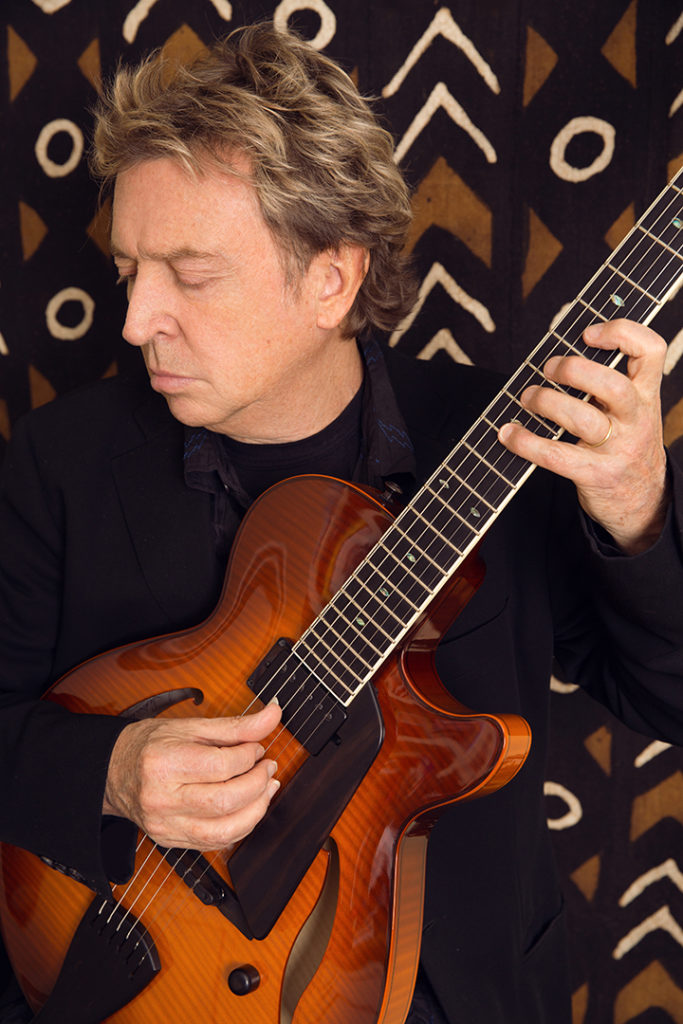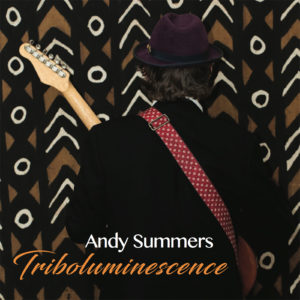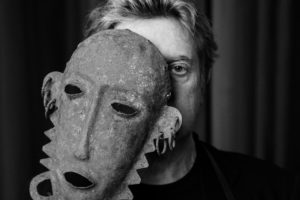
Andy Summers truly is a renaissance man. A musician of impeccable and ever-diversifying style, a photographer of not insignificant renown, and a writer worthy of regard, Summers has carved out a career that is as dynamic, eclectic and exceptional as it is prodigiously long.
It is a career that is laudable, intriguing and memorable on so many levels. And for many millions of people in the world, Summers is perhaps best known for a six year stint out of a nearly 50 year professional career when he was literally atop the pop culture summit as one third of the ground-breaking, record smashing and hugely popular group, The Police.
The band produced five studio albums, and toured the world relentlessly selling nearly 80 million albums in the process, and helped usher in the age of the music video as well as being part of what was termed ‘New Wave’ music that dominated the early 1980s alongside contemporaries such as Duran Duran, The Eurythmics, Spandau Ballet and others.
But Summers was already an established session and touring musician of some note before joining The Police, and has added to that esteem through his sometimes breathtakingly adventurous, but always well-crafted solo work, which has hit 14 albums upon the release of his latest creation – Triboluminescence, released in late March on all digital platforms as well as on vinyl.
Besides The Police, Summers composed a number of motion picture soundtracks in the 1980s and 1990s, including for films such as Down and Out In Beverly Hills, 2010 and The Craft. He has collaborated with King Crimson’s Robert Fripp, Eric Burdon of The Animals, his former Police bandmates Sting and Stewart Copeland, late Deep Purple keyboardist Jon Lord, Bad Company’s Paul Rodgers and dozens of other artists across an incredibly broad spectrum of musical genres.
Triboluminescence sees Summers at his exploratory best, as he delves into exotic sounds, unique compositional arrangements and a musical palate that is both challenging, yet immensely immersive and eminently listenable.
“For this album I knew I was following up on the set of parameters that I established on my 2015 record Metal Dog, which I felt was really non-standard jazz. I was creating textures and moods and doing some improvising, obviously, but trying to make a very exacting, but at the same time very experimental music based on the guitar. And, interestingly, that project that preceded Triboluminescence was never meant to be a record. I was creating music for dancers, but that project never came to fruition. I took that music and turned it into the Metal Dog CD, and that went really well and it was really well received – actually one of my best received albums in years. So I thought to myself, ‘right, I am on the right track, so I’d better keep going,” said Summers, who has lived in California, just outside Los Angeles, for many years.
 “With Triboluminescence I was trying to take the same ideas and approach and see if I can expand it. I have made many, many albums in my life and I am used to the process. I have a method that I have developed over many years. I am lucky that I have my own studio and all the gear and I have an engineer that I used all the time, so it allows me the chance to create when I want. I create in this beautiful cabin on my property that looks out over the ocean; some days I will just go out there with a very simple little recorder and some guitars. But the last two albums were actually all made by purely starting in the studio.
“With Triboluminescence I was trying to take the same ideas and approach and see if I can expand it. I have made many, many albums in my life and I am used to the process. I have a method that I have developed over many years. I am lucky that I have my own studio and all the gear and I have an engineer that I used all the time, so it allows me the chance to create when I want. I create in this beautiful cabin on my property that looks out over the ocean; some days I will just go out there with a very simple little recorder and some guitars. But the last two albums were actually all made by purely starting in the studio.
“I started by looking for a sonic quality with, obviously, the guitar and various pedals and devices. And I will experiment a lot and sometimes I will get a crazy sound that I think is really unusual and I start with that and see if I can make something of it. I work to mould it into a composition and then I add a bass line and add drums to it and keep moving it forward until it becomes a whole piece on its own. So it’s basically a one man process, which I am really enjoying. I play everything and I find when I do it all, it comes out much closer to the way my vision of it might be.”
Summers believes that a collection of music – such as an album – is still and important and viable artistic statement and is his preferred vehicle for creative expression, even if many pundits and prognosticators are predicting its imminent demise.
“I do believe in the album concept, and I do believe it’s still important. I grew up with it and I have spent my life doing it. We were taught to make these albums that were an overall picture where somehow the songs and the emotions were connected and there would be dips and curves in it. It’s a dynamic piece of art, like a painting or a novel. The sort of soundbite, five second mentality is not who I am and believe me I know all about that because on the street where I live and where my studio is in Venice near Los Angeles, Snapchat have bought up there of the buildings. So I am very aware of how ephemeral it all is and my studio is now basically surrounded by millennials and, boy, it’s something,” he said.
“But I believe in making an album. And my album is coming out on vinyl and in some places vinyl is starting to outsell the CD. This shows you that somewhere deep in the psyche, in the midst of all this bullshit of the modern world, lots of people are still happy to pick up a big black disk, put it on a record player, place the stylus on it and listen to what I believe is a superior quality of sound. Listen, maybe I am part of the last group of true believers, but what else am I supposed to do? About 10 years ago I thought, ‘well, I am not going to do any more albums, no one is buying them.’ But I live to put these things out – it’s like my soul, my mental landscape and I really enjoy the process. And I actually am selling them; the last one [Metal Dog] did really well, in relative terms.”
Summers describes himself as a musician first and foremost. That he happens to be a musician who was an integral part of a one of the most successful pop/rock musical trios in the history of late 20th century music as a member of the Police is, to him, simply one part of his artistic arc.
“I do think I would go mental if I didn’t have the ability to create music. I am not just starting out on this, I have been doing it a long time. It has sustained me mentally and spiritually for many years. I am a guitarist; I am a musician and I live music. I love playing it, I love making it, I love composing, I love being completely involved in it. And you know I also enjoy the accolades and the feedback that I get when I do good work. It’s very sustaining. It would be very hard to not be doing it,” he said, adding that he is proud of the music he created for Triboluminescence, and the fact that it is getting rave reviews and already selling at a respectable rate is even more encouraging.
“The response has been almost overwhelming, particularly in the U.S. – it’s more than I possibly could have hoped for. What I always say to myself is that I’m going to make these records and I am going to do the very best that I can at the time. I want to make the most progressive and artistic records that I can. What I am trying to do, essentially, is knock myself out. And then I play the music for some musical friends and if they all like it, I will feel good about releasing it out into the world.
“Listen, I am not expecting to be competing with Rihanna or Taylor Swift. But who cares? My music is as valid as anyone else’s. What I am trying to do is push the envelope. I am trying to bend and reshape what guitars can do – that’s my mission. This record has generated a lot of very positive comments. So that’s enough to spur me on to keep pushing the envelope and challenging myself because if you’re not into music for reasons as pure as that, then you shouldn’t be in it. With The Police, for me, as fantastic and life changing as it was, it’s something that I passed through. It was part of my process and development as a musician. It wasn’t the be all and end all of my existence then and it certainly isn’t today. I didn’t start playing guitar to be in a pop group that has had worldwide success. It was brilliant when it happened, we were all completely right for one another and made that amazing music. But it didn’t stop for me when we broke up. I feel all the best music I have ever made has been absolutely outside The Police.”
 Although The Police were seen as a rock/pop band with a unique take on the genre, Summers, as he’s already intimated, was a lover of jazz music from a very early age. It informed his approach to his chosen instrument and the combination of precision, virtuosity and improvisational adventurousness has carried through his entire career.
Although The Police were seen as a rock/pop band with a unique take on the genre, Summers, as he’s already intimated, was a lover of jazz music from a very early age. It informed his approach to his chosen instrument and the combination of precision, virtuosity and improvisational adventurousness has carried through his entire career.
“When I was a kid first starting out I was into jazz not rock music. I mean, you learn the basics like everyone, but what got me really excited was jazz and jazz guitar. I was totally fixated on learning how to get those sounds and play those songs that I was hearing on jazz records. By the time I was 16 I was playing well and I remember being very interested in harmonics and chords and how to do it all – that was the first musical language I was trying to master. Later on I went to London and was in rhythm and blues bands and had a fantastic time with that. I came to America to go to college for music and then went on to play classical guitar for a few years. My quest was always music, music, music – not pop,” Summers said.
“Later, of course, I got into The Police and it was sort of fully loaded. What was interesting was that Sting and I had very parallel musical backgrounds. We were both jazz freaks, but we also grew up with The Beatles and Stones and all the rest of it. But once we got together with Stewart we made unique music in The Police; music that was different sounding to a lot of what was out there at the time. But my interests were always more avant garde, like the stuff I did with Soft Machine and Robert Fripp, the latter of which I did while I was still in The Police. My tendencies were always there. It’s not something I tried to do to be hip, that’s where I really felt comfortable.
“The stuff we did in The Police felt organic and real at the time, just like this current phase is very natural for me, particularly doing it all on my own. But it’s not totally inaccessible and ‘out there.’ I could make a much more difficult record, a much more avant garde record than Triboluminescence; I have certainly got tracks where I could do that type of thing and make it much more challenging to listen to. But I think my natural tendency is that I’m lyrical. I am someone who believes more in tension and release, and giving the listener a chance. I am trying to make music that is very modern but still something you can listen to and enjoy.”
Summers doesn’t tour much these days, but says he is hoping to put together a multi-media show that will see him perform along to video and still photography.
“I have been thinking about doing something like that for years. It’s something that would make touring more interesting for me, and I think for the audience. It would be me talking, reading, playing my guitar, showing some of my photography. That’s the plan, anyways.”
For more information on Andy Summers and Triboluminescence, visit www.andysummers.com.
- Jim Barber is a veteran award-winning journalist and author based in Napanee, ON, who has been writing about music and musicians for a quarter of a century. Besides his journalistic endeavours, he now works as a communications and marketing specialist. Contact him at jimbarberwritingservices@gmail.com.
